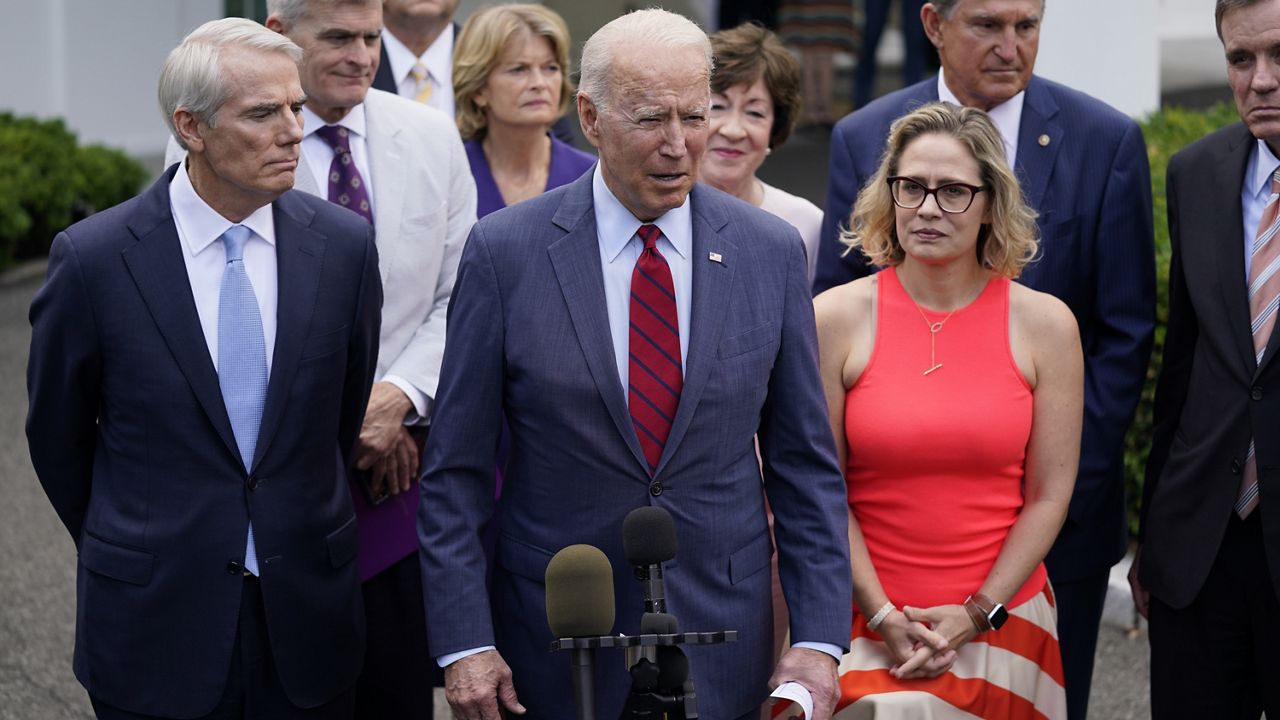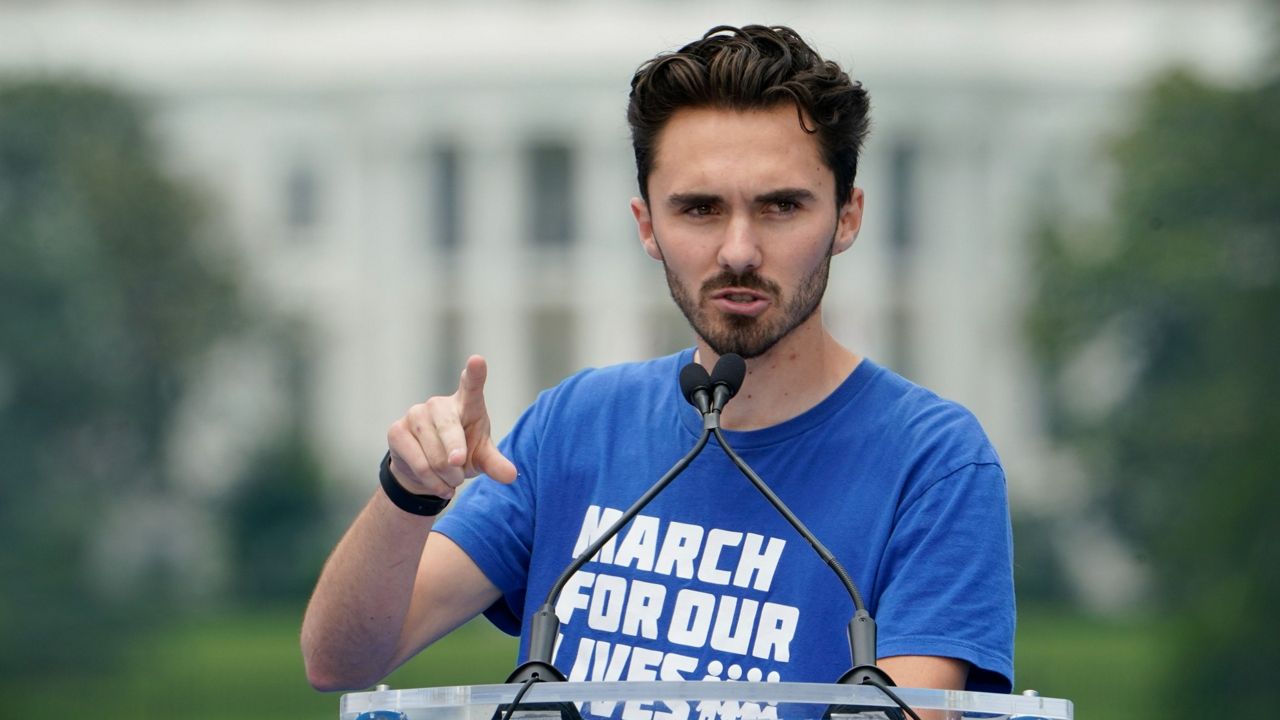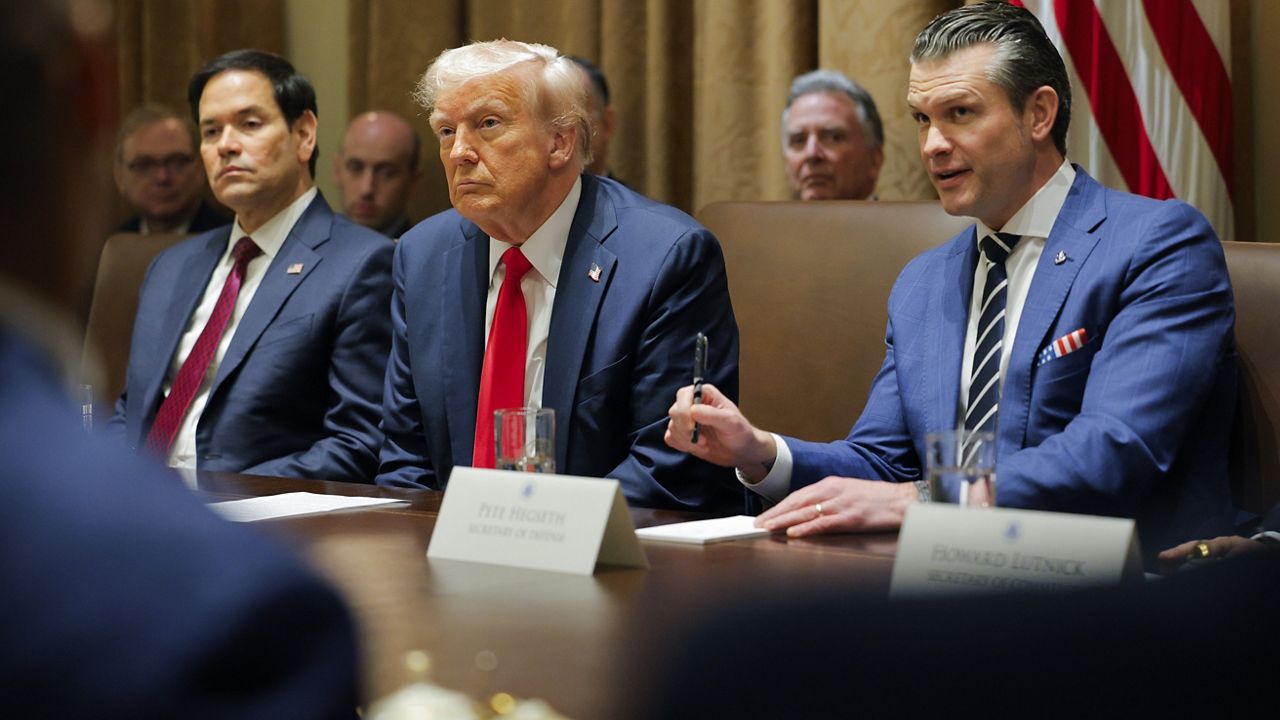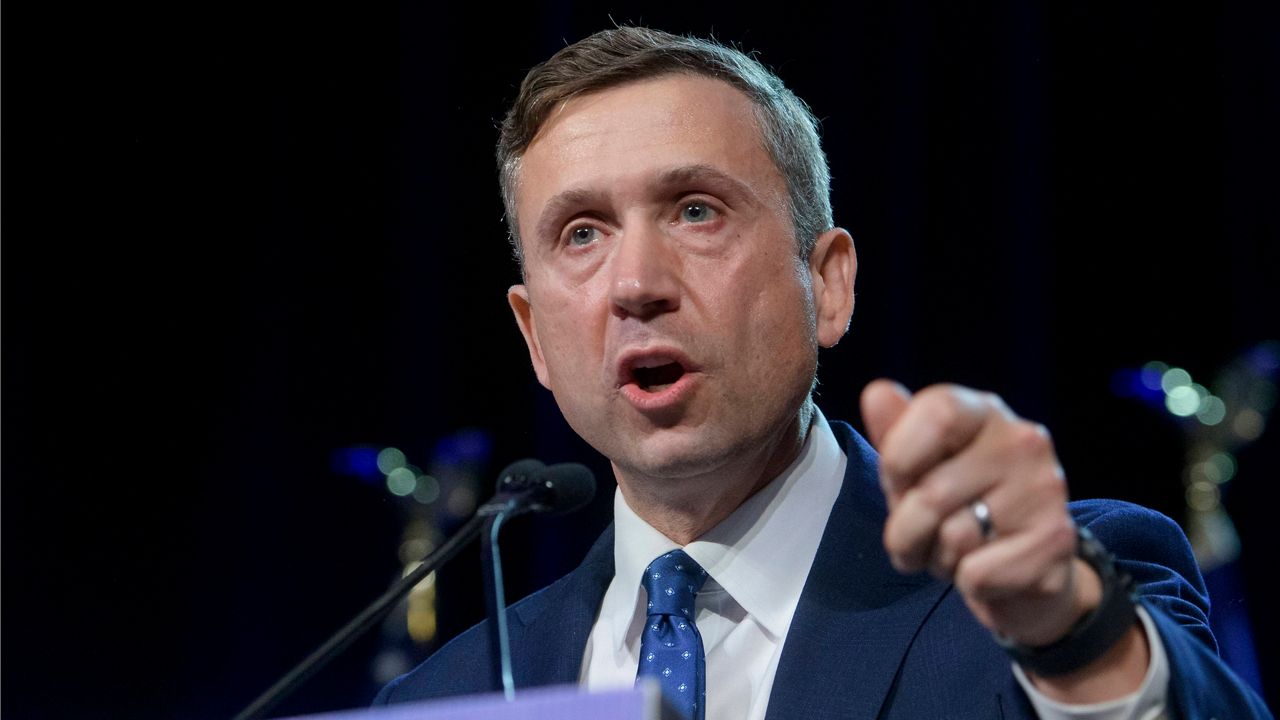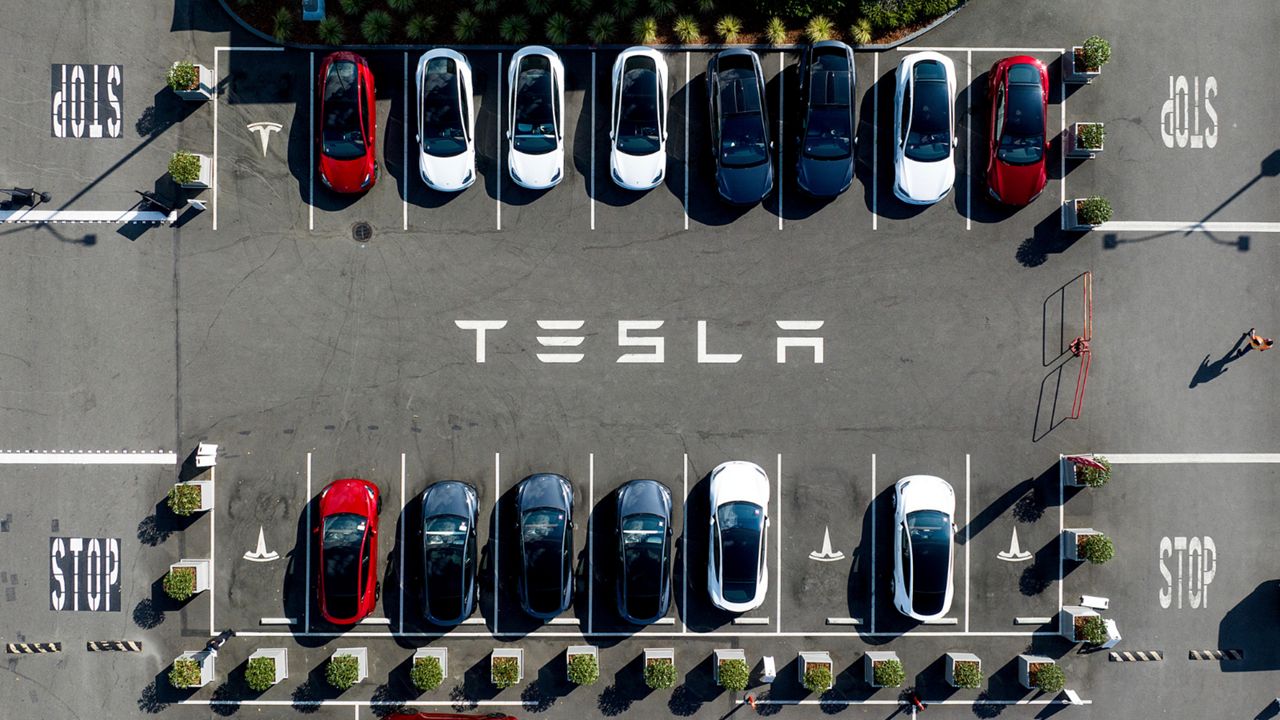President Joe Biden announced Thursday that he and a group of Democratic and Republican lawmakers have reached a deal on a bipartisan infrastructure proposal.
What You Need To Know
- President Joe Biden said that he has reached a deal group of both Democratic and Republican senators and has signed on to their bipartisan infrastructure proposal: "We have a deal"
- The White House laid out the specifics of the proposal: $1.2 trillion over 8 years, and $973 billion over 5 years, including $579 billion in new spending over the baseline
- Biden and other lawmakers confirmed that they are working on a two-track approach: The bipartisan compromise bill and a larger budget reconciliation measure, which will be worked on "in tandem"
- At a press conference Thursday, House Speaker Nancy Pelosi pledged that "there ain't going to be an infrastructure bill unless we have the reconciliation bill," making it clear that Democrats will be utilizing budget reconciliation to pass elements of Biden's infrastructure proposals
"We have a deal," Biden said in front of the White House after the meeting.
"We all agree that none of us got all we wanted," he said, adding: "This reminds me of the days when we used to get an awful lot done up in the United States Congress."
"Neither side got everything they wanted in this deal," the president said at a news conference later Thursday. "That's what it means to compromise. And it reflects something important — it reflects consensus. The heart of democracy requires consensus."
Biden noted that infrastructure used to be an easy thing to pass in Congress. But in recent years, he said "We devoted far too much time competing with one another and not enough time competing with the rest of the world."
The infrastructure bill is a sign to the world that "American democracy can deliver," Biden said. "There's nothing our nation can't do when we decide to do it together."
"They have my word, and I'll stick with what they proposed, and they've given me their word as well," Biden said, adding: "And where I come from, that's good enough for me."
The president said the group made "serious compromises on both ends."
In a subsequent statement released after the meeting, the White House laid out the specifics of the proposal: $1.2 trillion over 8 years, and $973 billion over 5 years, which includes $579 billion in new spending over the baseline.
"The $1.2 trillion Bipartisan Infrastructure Framework is a critical step in implementing President Biden’s Build Back Better vision," the statement reads. "The Plan makes transformational and historic investments in clean transportation infrastructure, clean water infrastructure, universal broadband infrastructure, clean power infrastructure, remediation of legacy pollution, and resilience to the changing climate. Cumulatively across these areas, the Framework invests two-thirds of the resources that the President proposed in his American Jobs Plan."
The plan contains $579 billion in new investments, including:
- $312 billion for transportation, including $109 billion for roads, bridges and major projects
- $49 billion for public transit and $66 billion for passenger and freight rail
- $7.5 billion each for EV infrastructure and for electric buses and transit
- $55 billion for water infrastructure
- $65 billion for broadband infrastructure
- $73 billion for power infrastructure, including grid authority
The plan also includes plans to replace U.S. lead pipes, Biden said, and will bring "clean drinking water to up to ten million American families and more than 400,000 schools and child care facilities that currently don't have it," including tribal communities. And he said, we're "going to do it all without raising a cent" from taxpayers making below $400,000 a year.
Proposed pay-fors include reducing the IRS tax gap, redirecting unused unemployment insurance relief funds, public-private partnerships, reinstating Superfund fees for chemicals, allowing states to sell or purchase unused toll credits for infrastructure, repurposing unused relief funds from 2020 emergency relief legislation and unemployment insurance program integrity, among others.
"Still, there is more work to do – to grow our economy, create jobs, improve living standards, reduce climate pollution, and ensure more Americans can participate fully and equally in our economy," the statement continued. "President Biden remains committed to the comprehensive agenda laid out in the American Jobs Plan and American Families Plan. He will work with Congress to build on the Bipartisan Infrastructure Framework in legislation that moves in tandem, and he is encouraged that both the House and Senate are working on budget plans that would do so."
"The American Jobs Plan, Biden said, "will create millions of good paying jobs - jobs Americans can raise their families on. … The kind of jobs that, as my father would say, can provide middle class Americans with a little bit of breathing room. I mean that sincerely. Think about people who can't take that breath, who have no margin for error."
President Biden and other lawmakers confirmed that they are working on a two-track approach: The bipartisan compromise bill and a larger measure which will be passed via budget reconciliation, which they aim to pass "in tandem."
Biden urged Congress "to pass the Bipartisan Infrastructure Framework and send it to his desk, and pass a budget resolution and legislation that makes his full Build Back Better vision a reality."
"I know a lot of you in the press, particularly, doubt that unity is possible; that anything bipartisan is impossible," Biden said. "It's hard, but it's necessary, and it can get done."
"Everybody tells me what my party is. My party is divided." Biden acknowledged. "Well, my party is divided. But my party is also rational. If they can't get every single thing they want, but all they have in the bill before them is good, are they going to vote no? I don't think so."
Arizona Sen. Kyrsten Sinema, a moderate in the Democratic caucus and one of the key infrastructure negotiators, said that "we can use bipartisanship to solve these challenges."
"No one got everything they wanted in this package. We all gave some to get some," Sinema said. "We are delighted to go back to the Hill and begin earning more support from both Republicans and Democrats to get this bill across the finish line."
Sen. Rob Portman, R-Ohio, called the infrastructure deal "a good compromise that's going to help the American people."
"I'm pleased to see we were able to come together on a core infrastructure package," Portman said, telling reporters the package will be done "without" new taxes.
"I'm pleased to see today that we're able to come together on a core infrastructure package," Portman said. "This is not non-infrastructure items without new taxes. This was a team effort."
He was joined in the Rose Garden by the group of senators, who appeared to be in remarkably good spirits as they laughed and fielded several questions from reporters. As Sen. Susan Collins, R-Maine, noted, "This is the largest infrastructure package in history."
"We've agreed on the price tag, the scope and how to pay for it," Collins added.
Added Montana Sen. Jon Tester: "This is a day where this place has worked."
On the subject of a reconciliation measure to go along with the bipartisan deal, Biden said that "Republicans did not want to go along with the human infrastructure that I talk about, and we'll see what happens in the reconciliation bill and the budget process."
At a press conference earlier Thursday, Pelosi pledged that "there ain't going to be an infrastructure bill unless we have the reconciliation bill," making it clear that Democrats will be utilizing budget reconciliation to pass elements of Biden's infrastructure proposals
"We will not take up a bill in the House until the Senate passes the bipartisan bill and a reconciliation bill," Pelosi said. "If there is no bipartisan bill then we'll just go when the Senate passes a reconciliation bill. But I'm hopeful that we will have the bipartisan bill."
Biden backed Pelosi's position, and pledged that a reconciliation measure will happen "swiftly and in tandem" with the bipartisan measure.
"For me, investment in our physical and human infrastructure are inextricably intertwined. Both need to get done," Biden told reporters.
"If the [bipartisan infrastructure bill] is the only thing that comes to me, I'm not signing it. It's in tandem," he said, adding: "I'm not just signing the bipartisan bill and forgetting the rest of it."
Other Democrats shared Pelosi's sentiments and urged for a larger reconciliation deal to accompany the bipartisan bill.
Ohio's other Senator, Democrat Sherrod Brown, said the bipartisan bill is "a bit anemic."
"It’s OK, it’s a start," Brown told Spectrum News. "But we can’t lose sight of the fact that we’ve got to go big and we’ve got to find a way to pay for it."
New York Rep. Alexandria Ocasio-Cortez, a leading Progressive voice in the House Democratic caucus, shared a photo on Twitter of the bipartisan negotiating group and wrote, "the diversity of this “bipartisan coalition” pretty perfectly conveys which communities get centered and which get left behind when leaders prioritize bipartisan dealmaking over inclusive lawmaking (which prioritizes delivering the most impact possible for the most people)."
California Sen. Alex Padilla said that the bill "doesn’t meet the moment" and is "not enough."
Oregon Sen Ron Wyden said that he is "not willing to support throwing climate overboard," but said that he is "open" to the reconciliation measure.
"The two bills have got to be directly connected, and they have to have real and strong commitments on [progressive] issues," Wyden added.
Other Democrats were excited about the measure, including New York Rep. Carolyn Maloney, who took to Twitter to write that she "can't wait to vote for this infrastructure deal AND our reconciliation package."
"Our workers, our caregivers, & our infrastructure are the best investments we can make to help boost our economy," Maloney added.
West Virginia Sen. Joe Manchin, one of the key bipartisan negotiators and a moderate Democrat, said that he has "committed to working on a second package"
"We're working on a reconciliation package now, actually," Manchin said.
“It’s the only strategy we have — is two track," Manchin said, adding: "Reconciliation is inevitable."
Senate Majority Leader Chuck Schumer celebrated the compromise: "The agreement between the bipartisan group of senators and the president - something I've encouraged - is a good step forward."
Schumer pledged that work continues on the reconciliation measure, with the plan being to vote on both pieces in July.
Senate Minority Leader Mitch McConnell has not yet committed to supporting the bipartisan deal, saying he is "still listening.”
Biden has sought $1.7 trillion in his American Jobs Plan, part of nearly $4 trillion in broad infrastructure spending on roads, bridges and broadband internet but also the so-called care economy of child care centers, hospitals and elder care.
With Republicans opposed to Biden’s proposed corporate tax rate increase, from 21% to 28%, the group looked at other ways to raise revenue. Biden rejected their idea to allow gas taxes paid at the pump to rise with inflation, viewing it as a financial burden on American drivers.
The group agreed on Biden's goal of infrastructure investments without raising taxes on anyone who makes under $400,000.
"We're going to do it all without raising a cent from earners below $400,000," Biden said at the White House. "There's no gas tax increase, no fee on electric vehicles."
The Democratic leaders also insisted on the two-track process, starting with initial votes in July to consider the bipartisan deal and to launch the lengthy procedure for the Democrats' proposal, now drafted at nearly $6 trillion.
On the subject of the price tag for the reconciliation measure, Sen. Bernie Sanders, I-Vt., said he believes $6 trillion "is the appropriate amount of money to address the crises facing this country."
"But obviously I have to work with 49 other senators to come up with a bill," he added.
The Democrats' bigger proposal would run through the budget reconciliation process, which would allow passage of Biden's priorities by majority vote, without the need for support from Republicans to overcome the Senate's 60-vote threshold. It would require multiple rounds of voting that are likely to extend into fall.
Schumer said, “One can’t be done without the other.”
"If we get some compromise there and if we can't, see if I can attract all Democrats to the position where they can move it on the dual track," Biden added.
"I'm going to drive you crazy the next four years," he added. "Because I'm going to tell you the truth as I see. I know the Senate and the House better than most of you know it.
"It doesn't mean I'm going to turn out to be right all the time. But I'm not going to negotiate with the press while I'm negotiating privately with my colleagues - and these are very tough decisions," Biden said. "I don't in any way dismiss what Sen. Murphy says about the environment. I don't dismiss it at all."
"Why? Biden asked, dropping his voice to a show-whisper: "I wrote the bill. On the environment. Why would I not be for it? The question is, how much can we get done?"




